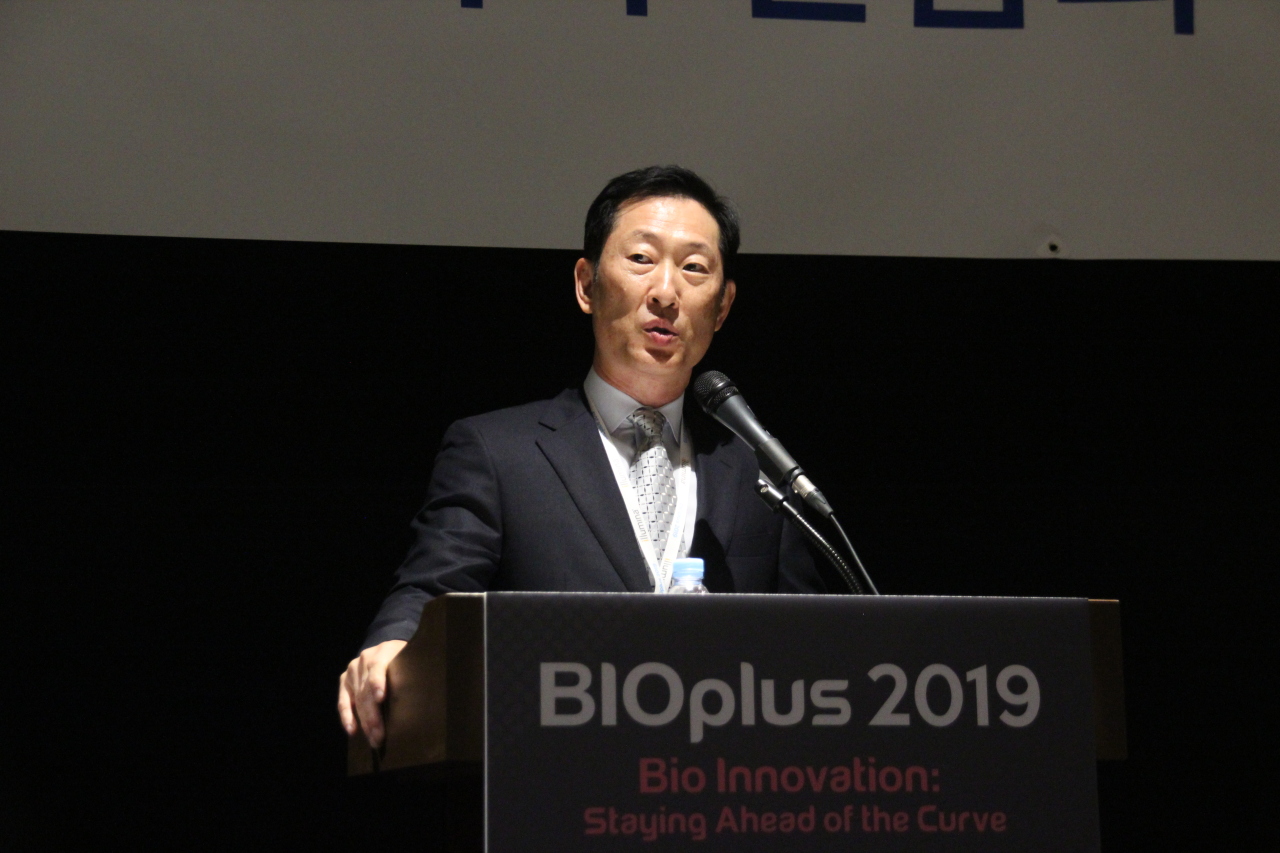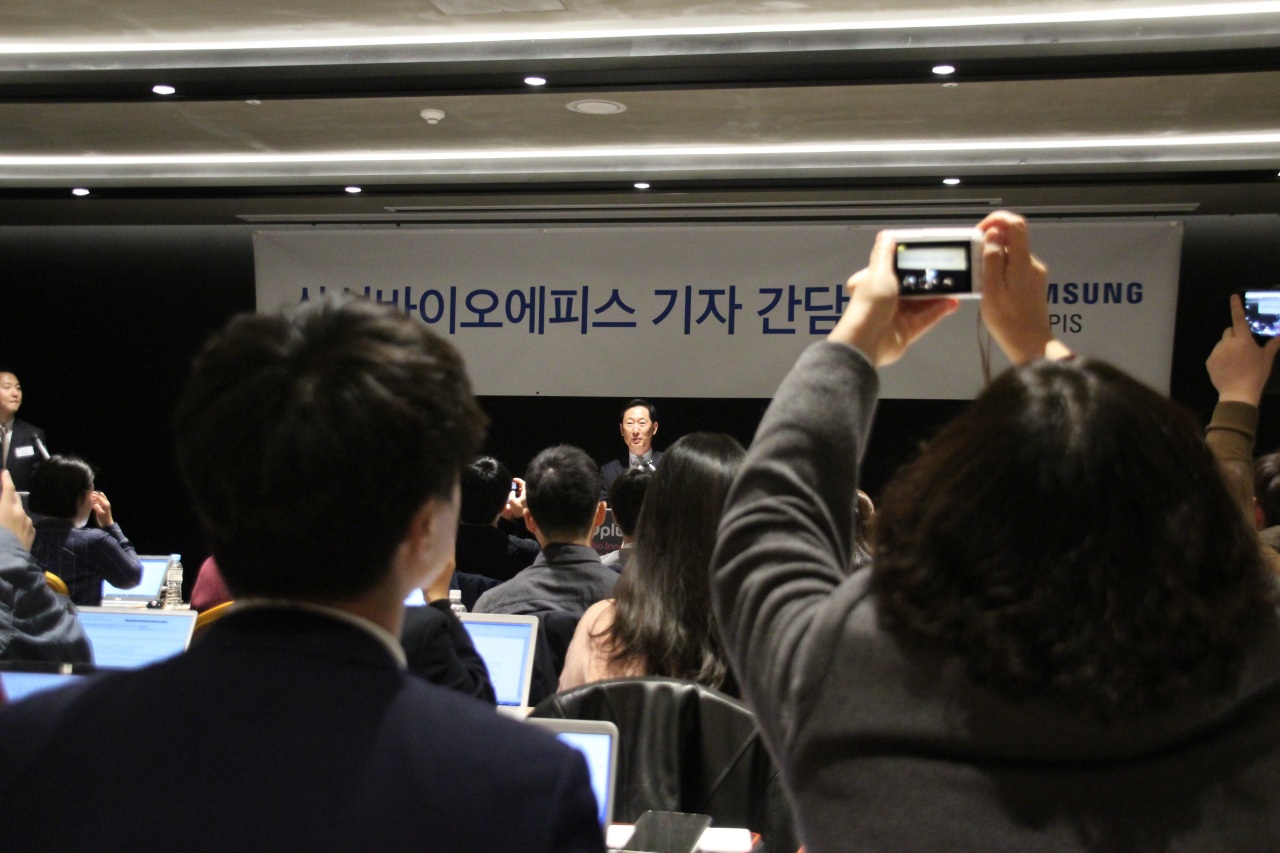Samsung Bioepis is anticipated to turn a profit for the first time since the company’s foundation, CEO Ko Han-sung said Tuesday at a press conference, estimating over 1 trillion won ($859 million) revenue in 2019.
“We have never held a press conference prior to this one, thinking a company in deficit has nothing to say -- but we expect to turn a profit this year,” said Ko during the conference on the sidelines of the BIOplus 2019 forum at Coex exhibition hall in Seoul.
 |
Ko Han-sung holds his first-ever press conference as Samsung Bioepis CEO, on Tuesday at Coex, Seoul, on the sidelines of BIOplus conference. (Lim Jeong-yeo/The Korea Herald) |
Samsung Bioepis was founded in 2012. The company is not listed, and therefore has no duty to publicly report its quarterly earnings. Clues to its performance, however, could be gauged from the business reports of Samsung BioLogics, its main stakeholder that is listed in Korea’s main bourse Kospi.
“Our cumulative business up to the third quarter has been exceptional,” Ko said, “If there are no contingencies, we will reap record revenue and operating profit this year.”
The company currently has four biosimilars launched in Europe and one in the US. Most of the earnings it enjoys comes from Europe. Samsung Bioepis’ autoimmune disease treatments have marked roughly 650 billion won revenue in Europe by third quarter.
Especially towing the company’s business are Benepali, an Enbrel biosimilar (etanercept) and Imraldi, a Humira biosimilar (adalimumab), Ko said.
Benepali launched in five European nations -- the UK, Germany, France, Spain and Italy -- in 2016, where it has surpassed the original Enbrel’s market dominance with an accumulated revenue of 1.5 trillion won since its launch.
Imraldi launched in October 2018 with ompeting products from firms Amgen, Sandoz and Mylan. Based on its ability to mass-produce and offer price competitiveness, Bioepis has stayed at the front of the race, making approximately 170 billion won from Imraldi in the one year it was commercially available.
The pace at which Bioepis is growing is one to note, driven by long-term investments, Ko said, as it had been a norm for the traditional big pharmas to take 20 years to cross that milestone.
“There is an edge in knowing that there will be initial deficits and still going into that business,” said Ko, “While many firms focus selectively on one or two drug candidates, Bioepis had the financial capacity to simultaneously develop multiple drugs, yielding faster financial returns.”
 |
Samsung Bioepis CEO Ko Han-sung holds press conference on Tuesday. (Lim Jeong-yeo/The Korea Herald) |
Bioepis has annually added about 100 employees each year. After eight years, the company now has some 860 staff.
The future of biosimilars will increasingly center on big firms that are able to offer price competitiveness, Ko emphasized several times. Small firms will gradually be pushed out of the global market, he said.
Bioepis has established a business development team in 2018, through which it is actively seeking out partners it could collaborate with for drugs development. The company has pipelines SB11 and SB15 for ophthalmology treatment and SB12 for rare disease treatments. For the ophthalmology line, Bioepis signed with its other major stakeholder Biogen on Thursday for a deal the size of 440 billion won for joint marketing in Europe and the US.
As for initial public offering, Ko said Bioepis has ample funds it needs, but if there is a need for a greater resource for the “next step” in business, it could list any time.
By Lim Jeong-yeo (
kaylalim@heraldcorp.com)









